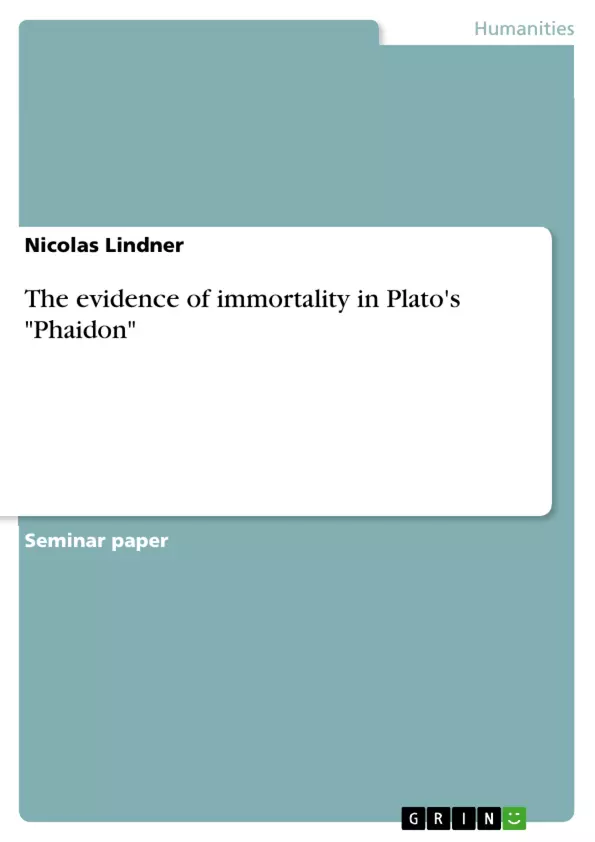Plato's "Phaidon" describes the events on the day of Socrates' death. Unlike the trial writings Apology and Kriton, however, this is not to be classified as a historical document, which is primarily concerned with a realistic reproduction. This is indicated on the one hand by the fact that the narrator states that he himself was not present on the day of his death, and on the other hand by the literary form chosen, in which a spatial and temporal distance is established from the events. Plato's main concern in Phaidon is rather to prove the immortality of the soul. In order to provide this proof, he has Socrates present four proofs of immortality, which will be the subject of this work. In these proofs, Plato makes use of his central philosophical concepts: the doctrine of ideas and the doctrine of recollection.
Inhaltsverzeichnis (Table of Contents)
- Introductory
- The first proof of immortality of the soul (70d - 72e)
- The need to arise from opposites
- The need for cyclical regeneration
- The Second Proof of Immortality of the Soul (72e-77a)
- The Third Proof of The Soul's Immortality (77b-84b)
- The fourth proof of the soul's immortality (103c-107b)
- Summary and outlook
Zielsetzung und Themenschwerpunkte (Objectives and Key Themes)
The primary objective of this work is to present and analyze Plato's arguments for the immortality of the soul as presented in his dialogue, Phaidon. This analysis focuses on the four proofs of immortality presented by Socrates, using his central philosophical concepts of the doctrine of ideas and the doctrine of recollection.
- The concept of the soul's separation from the body and its implications for true knowledge.
- The examination of the "principle of arising from opposites" and its application to the relationship between life and death.
- The exploration of cyclical regeneration and the notion of the soul's rebirth.
- The analysis of the validity of Plato's proofs through critical questioning and consideration of potential weaknesses.
Zusammenfassung der Kapitel (Chapter Summaries)
- Introductory: This chapter sets the stage for the analysis of Plato's arguments by introducing the context of Socrates' death, the setting of the Phaidon dialogue, and Plato's primary concern: proving the immortality of the soul. It highlights the role of the doctrine of ideas and the doctrine of recollection in these proofs.
- The first proof of immortality of the soul (70d - 72e): This chapter examines the first proof of immortality, which draws upon Orphic-Pythagorean ideas of the soul's journey to the underworld and rebirth. It delves into the argument's two key components: the necessity of arising from opposites and the need for cyclical regeneration. The chapter also analyzes the strength and weaknesses of this proof, focusing on the "principle of arising from opposites."
Schlüsselwörter (Keywords)
The main keywords and focus topics of this work are: Plato, Phaidon, immortality of the soul, doctrine of ideas, doctrine of recollection, principle of arising from opposites, cyclical regeneration, rebirth, philosophical argument, critical analysis.
Frequently Asked Questions
What is the main theme of Plato's "Phaidon"?
The Phaidon describes the final hours of Socrates and focuses primarily on providing philosophical proofs for the immortality of the soul.
What is the "doctrine of recollection"?
Plato argues that learning is actually a process of remembering (anamnesis) knowledge that the soul possessed before being born into a human body.
How does the "principle of opposites" prove immortality?
Socrates argues that everything arises from its opposite (e.g., waking from sleeping). Therefore, life must arise from death, implying a cyclical regeneration of souls.
How many proofs of immortality are presented in Phaidon?
Plato presents four distinct proofs, including arguments from opposites, recollection, affinity (the soul's likeness to the divine), and the final proof involving the Form of Life.
Is the Phaidon a historical account of Socrates' death?
No, it is a literary and philosophical dialogue. Plato himself was not present, and he uses the setting to explore his own central concepts like the doctrine of ideas.
- Arbeit zitieren
- Nicolas Lindner (Autor:in), 2008, The evidence of immortality in Plato's "Phaidon", München, GRIN Verlag, https://www.grin.com/document/1156923



